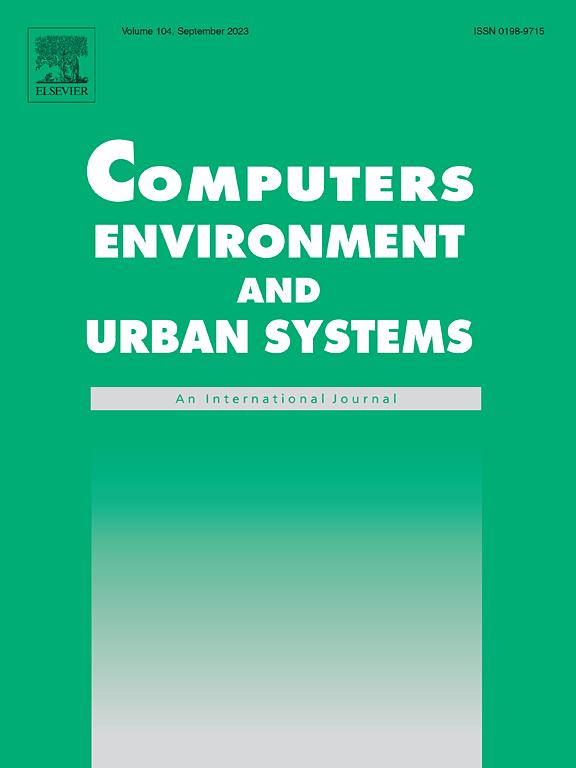利用开放的地理空间数据和深度学习,为现实的行人导航提供具有高程剖面的专门包容性道路数据集
IF 8.3
1区 地球科学
Q1 ENVIRONMENTAL STUDIES
Computers Environment and Urban Systems
Pub Date : 2024-10-03
DOI:10.1016/j.compenvurbsys.2024.102199
引用次数: 0
摘要
建筑环境特征在很大程度上会影响行人的路线选择,除距离因素外,诸如可达性、便利性、安全性和美观性等因素也起着至关重要的作用。尽管谷歌地图和 Waze 等当前的导航应用程序已经成功地提供了行车导航,但它们的导航服务不足以满足行人的需求,有时甚至是不切实际的,这主要是由于缺乏专门的行人网络和相关的导航算法。为弥补研究空白,本文提出了一种新方法,将免费提供的地理空间数据与计算机视觉技术相结合,为户外行人导航创建专门的包容性网络数据集。此外,本文还开发了一种行人导航算法,通过结合人行道的各种属性,生成更实用的 "最短 "和 "备选 "路径。我们应用该方法在拉斯维加斯创建了一个行人导航网络。SpaceNet 的开放图像数据集用于提取拉斯维加斯的道路网络。虚拟审核流程利用谷歌街景图像对人行道网络的视觉和运行属性进行评估,评估因素包括人行道的存在、宽度、表面类型和状况、缺失的路边坡道、绿化、免受天气条件影响以及照明。谷歌地球的开放式高程数据被用来分析道路高程剖面,作为轮椅使用者无障碍通行人行道的有意义的三维指标。此外,还检测和分析了网络的其他几何特性,包括道路弯曲度、与道路交叉口的距离和方向变化。通过对不同行动能力的个人(包括普通行人、老年人和轮椅使用者)进行导航实验,证明了新开发的网络和算法在满足行人不同需求方面的有效性。本文章由计算机程序翻译,如有差异,请以英文原文为准。
A specialized inclusive road dataset with elevation profiles for realistic pedestrian navigation using open geospatial data and deep learning
Built environment characteristics can greatly influence pedestrians' route choices with factors beyond distance, such as accessibility, convenience, safety, and aesthetics, playing crucial roles. Although current navigation apps, such as Google Maps and Waze, have successfully provided driving directions, their navigation services are insufficient and sometimes unrealistic for addressing pedestrians' needs, largely due to the lack of dedicated pedestrian networks and the associated navigation algorithms. To address the research gaps, this paper proposes a novel approach that integrates freely available geospatial data and computer vision technology to create a specialized inclusive network dataset for outdoor pedestrian navigation. Moreover, a pedestrian navigation algorithm is developed to generate more practical “shortest” and “alternative” paths by incorporating various sidewalk attributes. We applied the method to create a pedestrian navigation network in Las Vegas. SpaceNet's open imagery dataset was used to extract Las Vegas's road networks. A virtual audit process assessed the visual and operational properties of the sidewalk networks using Google street-level images, evaluating factors including sidewalk presence, widths, surface types and conditions, missing curb ramps, greenery, protection from weather conditions, and lighting. Google Earth's open elevation data were used to analyze road elevation profiles as meaningful 3D indicators of sidewalk accessibility for wheelchair users. Further, additional geometric properties of the network, including road curviness, proximity to road intersections, and directional changes, were detected and analyzed. A navigation experiment conducted with individuals having varying mobility abilities, including regular pedestrians, older adults, and wheelchair users demonstrated the effectiveness of the newly developed network and algorithm in meeting the diverse needs of pedestrians.
求助全文
通过发布文献求助,成功后即可免费获取论文全文。
去求助
来源期刊

Computers Environment and Urban Systems
Multiple-
CiteScore
13.30
自引率
7.40%
发文量
111
审稿时长
32 days
期刊介绍:
Computers, Environment and Urban Systemsis an interdisciplinary journal publishing cutting-edge and innovative computer-based research on environmental and urban systems, that privileges the geospatial perspective. The journal welcomes original high quality scholarship of a theoretical, applied or technological nature, and provides a stimulating presentation of perspectives, research developments, overviews of important new technologies and uses of major computational, information-based, and visualization innovations. Applied and theoretical contributions demonstrate the scope of computer-based analysis fostering a better understanding of environmental and urban systems, their spatial scope and their dynamics.
 求助内容:
求助内容: 应助结果提醒方式:
应助结果提醒方式:


